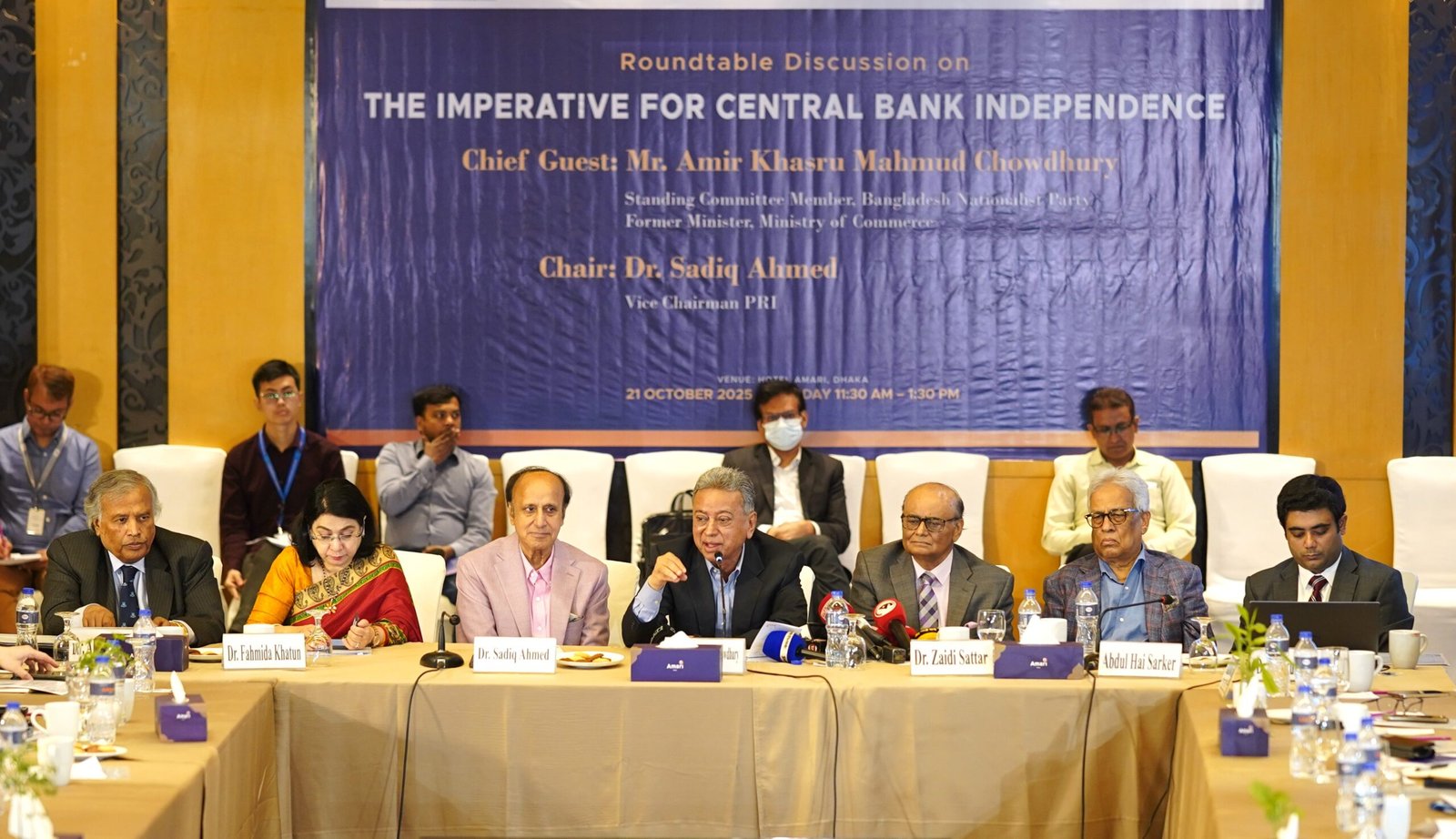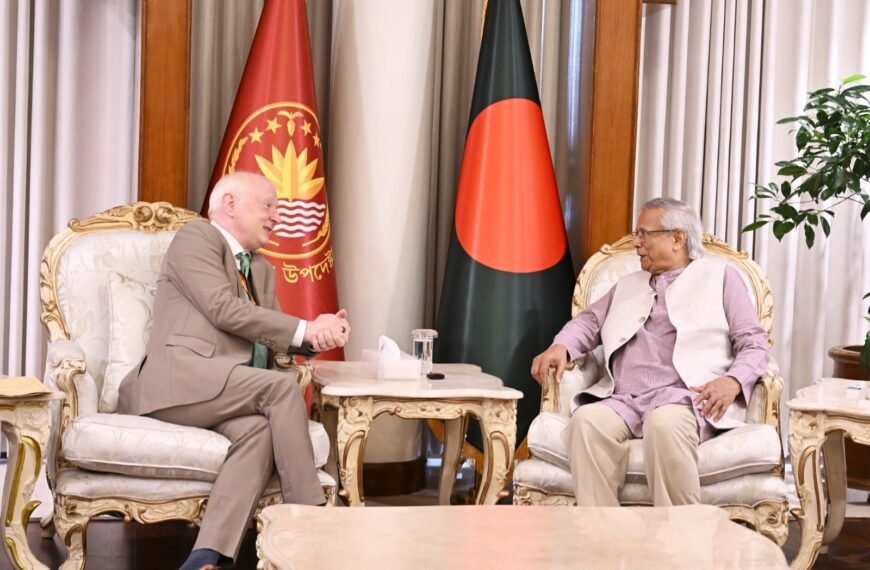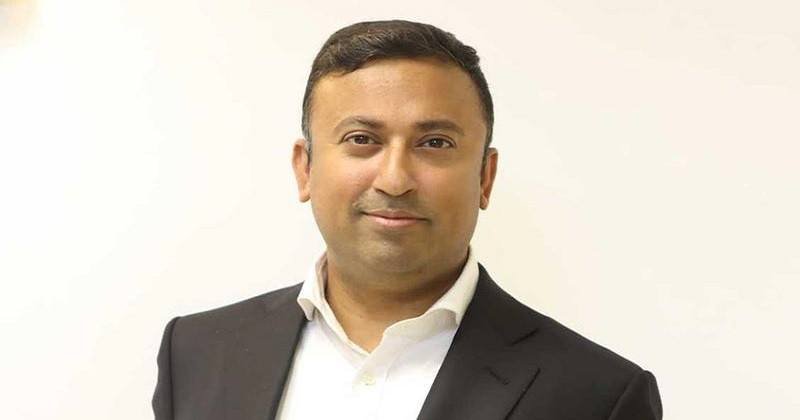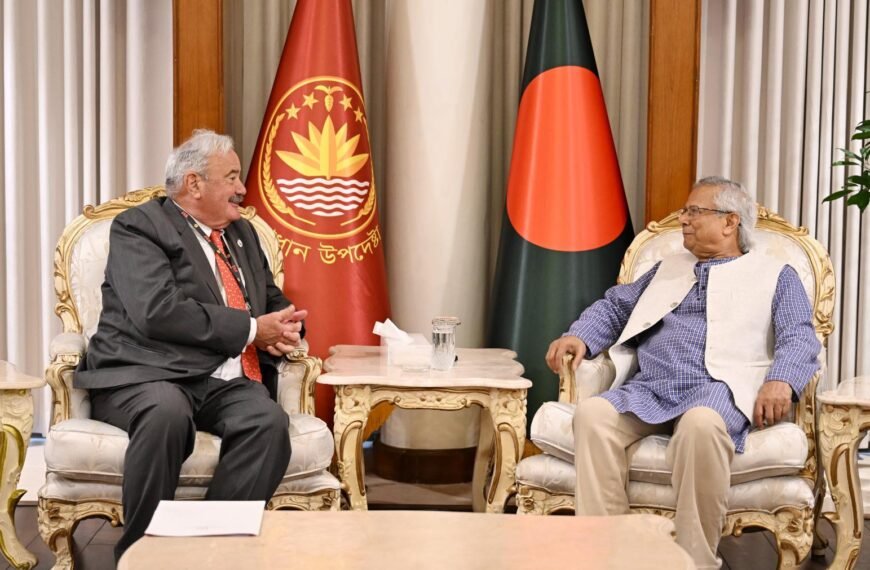The Policy Research Institute of Bangladesh (PRI), in partnership with the UK International Development, hosted a roundtable, “The Imperative for Central Bank Independence”, today on Tuesday (October 21, 2025) at the Hotel Amari, Gulshan.
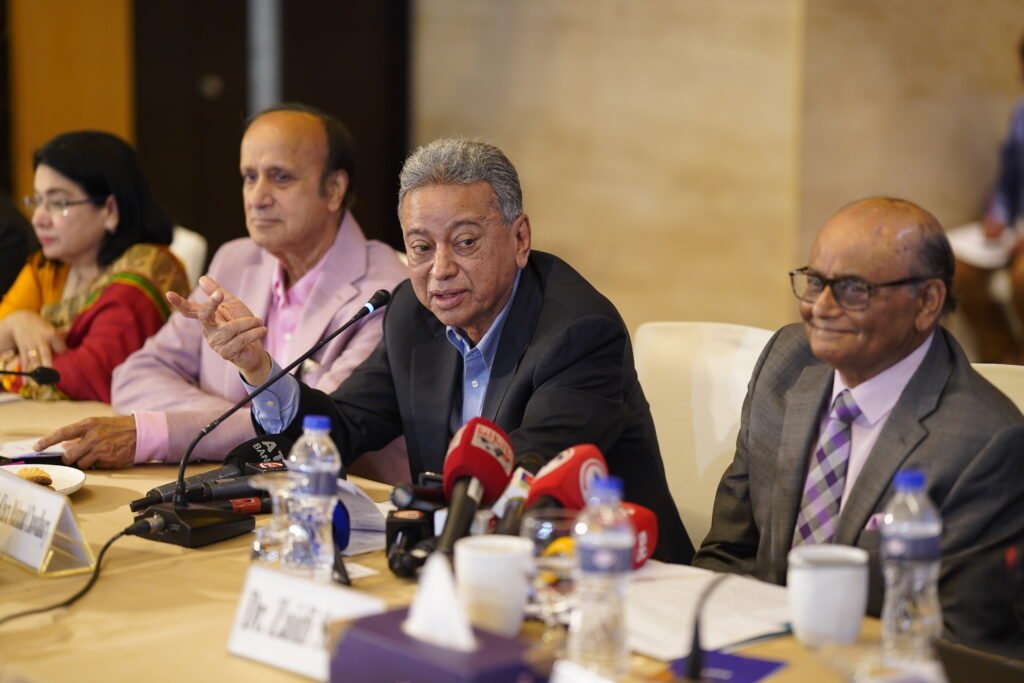
Mr. Amir Khasru Mahmud Chowdhury, Standing Committee Member of the Bangladesh Nationalist Party (BNP) and former Minister for Commerce, attended the event as the Chief Guest. He affirmed that, “Either you are [the institution] independent or not — autonomy is not an option. The economy will not function properly without ensuring the independence of Bangladesh Bank. This is not only my personal view but also the official position of my political party. My party, when in power, never eroded central bank independence through political appointments. Bureaucrats, no matter how experienced they are, cannot substitute for specialized expertise in sectors like central banking.” He also emphasized that, “For the central bank to have real effectiveness, the Financial Institutions Division (FID) must be abolished without question.”
The session was chaired by Dr. Sadiq Ahmed, Vice Chairman of PRI.In his opening remarks, Dr Ahmed said that, “No wonder there is a short-term trade off between inflation targeting and growth as shown in the Philips curve. The govt. mostly focus on the growth and employment. But an independent central bank will focus on inflation control, unlike a central bank under political pressure.”
The trigger presentation was delivered by Dr Ashikur Rahman, Principal Economist at PRI, who highlighted that, “The issue of central bank independence has long been a subject of discussion. Theoretical models and cross-country experience are suggestive that inflation can be effectively controlled when inflation expectations are anchored at low levels, money supply is properly managed, and the exchange rate remains stable. Such macroeconomic management is only possible when the central bank enjoys credibility, and that credibility stems from its independence. This is why, since the 1990s, central bank independence has become a dominant doctrine in economic management. When supply shocks occur, their impact is mitigated by a tight monetary policy. Therefore, economic logic should direct monetary policy, not narrow political interests, which can only happen if we have an independent and capable Central Bank. As Chanakya said some two thousand years ago, a smart person learns from his mistakes, but a wise person learns from the mistakes of others. Politicians must internalize lessons from past mistakes in the financial sector and do better in the future.”
A distinguished panel of economists, bankers, and industry leaders contributed to the discussion. Among them were: Mr. Abdul Hai Sarker, Chairman, Bangladesh Association of Banks (BAB); Dr. Mohammad Akhtar Hossain, Chief Economist, Bangladesh Bank; Dr. Fahmida Khatun, Executive Director, Centre for Policy Dialogue (CPD); Mr. Syed Nasim Manzur, President, Leathergoods and Footwear Manufacturers & Exporters Association of Bangladesh (LFMEAB); Dr. M. Masrur Reaz, Chairman and CEO, Policy Exchange of Bangladesh; and Mr. Showkat Aziz Russell, President, Bangladesh Textile Mills Association (BTMA). Panelists emphasized that a genuinely independent central bank is key to maintaining investor confidence, reducing inflationary pressures, and safeguarding the economy against fiscal dominance.
Dr. Akhtar Hossain said, “The central bank should enjoy autonomy under the government, rather than full independence.”
Dr. Khatun outlined four reasons why an independent central bank is necessary. She noted, “The political government must take the initiative by passing an independence law and ensuring its proper implementation. The financial sector is the lifeline of the economy, and safeguarding its integrity is essential.”
Dr. Nasim Manzur criticized, “The coexistence of the Financial Institutions Division (FID) and Bangladesh Bank is unnecessary. Bangladesh has to be freed from bureaucratic control. Full independence of the Bangladesh Bank is what we need, not merely autonomy. Ultimately, the effectiveness of the institution depends on leadership, underscoring the importance of a transparent and merit-based appointment process for the Governor.”
Dr. Reaz remarked, “Bangladesh must have a clearly defined monetary policy role, with explicit legal provisions prohibiting direct government lending. Bangladesh Bank should determine its own budget. The X-factor here is political will. Without it, none of these reforms will work. Politicians must learn from past experiences.”
Mr. Showkat Aziz Russell humorously said, “The number of bank branches now seems to exceed that of grocery stores. These are mostly mushroom banks. Such over-licensing and excessive branching have driven up the cost of funds. Ironically, Bangladesh Bank appears to be the only profitable institution in the country.”
Mr. A.H. Sarker said, “Accountability alongside independence will be crucial to address.”
During the open floor discussion, participants deliberated on the institutional reforms and governance mechanisms necessary to strengthen Bangladesh Bank’s independence.
Dr. Zaidi Sattar, Chairman of PRI, delivered the closing remarks. “We need a central bank that will support macroeconomic stability and promote growth-friendly policies. Central Bank Independence is IDEAL, but it doesn’t look easy to happenat once, as it is a very political decision. He added that 40% of the deficit is financed by the external sector, which is a positive thing.The rest of the deficit financing comes from public borrowing and borrowing from the banking sector. Borrowing from the Central Bank essentially means printing money, which fuels inflation, while borrowing from other banks crowds out funds for the private sector. Therefore, Bangladesh Bank needs a clear hierarchy of objectives: price stability first, while financial stability and growth promotion should be pursued through coordinated instruments in collaboration with the Ministry of Finance.”
The program was also streamed live on PRI’s official Facebook page.

